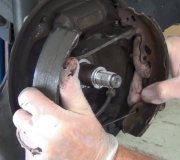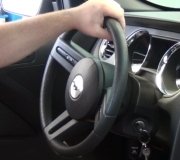The brakes do not drag at all most of the time. I am usually able to roll the car in neutral without restriction. So far, the brakes overheat and start to seize only when I drive at highway speeds in the mid-afternoon when ambient temperatures are around 90, (and only westbound--weird!). I haven’t done any more braking than usual when they start dragging and overheating. Pulling over and stomping on the brake pedal a few times seems to unlock it.
The mechanic did not measure the push-rod or compare it to the push-rod on the old booster. He said replacement boosters were factory preset and that he never had to readjust a replacement booster. He claims the problem is more likely in the ABS or something else.
On the other hand, I wonder if the push-rod is just a fraction too long, but not long enough to cause dragging at normal ambient temperatures, and if high afternoon temperatures maybe heat up the master cylinder just enough to increase pressure in the hydraulic system to make the brakes drag.
I plan to get a $15.00 H-tool for measurement, take the master cylinder back off, and measure the push-rod to see if it is too long and needs to be readjusted. I have to remove a lot of stuff to get at it, so if there is a possible simpler solution, I’d like to hear it.
Does anyone have any insights or suggestions?
SPONSORED LINKS
Sunday, September 22nd, 2019 AT 8:41 PM



